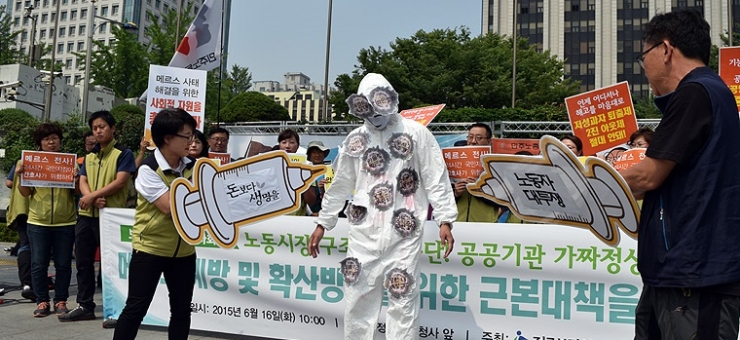News
Update: KHMU fights MERS crisis: ''our hospitals are like battlefields''

As the media has already covered, Korea is fighting against MERS (Middle East Respiratory Syndrome), with the first outbreak officially recorded in Korea on May 20. As of June 17 MERS has claimed the lives of 20 patients and 162 patients have been confirmed to have MERS. A further 6,506 people are either quarantined in hospital or at home. A total of 28 health care workers (4 medical doctors, 9 nurses, 7 care-givers and 8 others) who were exposed to patients are confirmed to have contracted MERS.
Today, even though the WHO has reported that there is no infection in the community, the fear of MERS amongst the Korean community is very real. Hundreds of kindergarten and primary schools have closed. The economy is affected by falling local consumption and by the cancellation of tourist travel and international conferences in Korea. Symbolic of this is the number of public transportation users - numbers have dropped by 35%. Concerts, performances, seminars and events have been cancelled or postponed indefinitely.
According to the Korea Economic Insitute, if MERS continues, by the end of August, South Korea's GDP loss will amount to 2 trillion Korean Won.
At the first stage of MERS infection, the Korean Health and Medical Union, (KHMU) created a Situation Chart which they have continually updated on the union's website. The union has also kept up to date figures detailing MERS patients, the hospitals with infected patients, and hospitals without infected patients, along with guidelines for workers and citizens.
On June 16 the KHMU held a demonstration to show the importance of the MERS fight in front of Government Administration Office in Kwanghwamoon Street, where the Korean Confederation of Trade Unions' Sit-In demonstration tent is also located. Sister Yoo Ji-Hyun, KHMU President, used a theatrical performance to kill the MERS virus during the demonstration. She said "Our hospitals are like battlefields. Nurses, ambulance drivers, and care-givers are all fighting against MERS despite the high risk to their own lives. But they face a double-discrimination Protective clothing and equipment are not being adequately supplied, and shifts are not being properly staffed, meaning that along with the threat of infection staff are facing serious fatigue. Currently, 83 hospitals are either taking care of MERS patients or have had MERS patients visit.
MERS is also a risk to service sector workers who come into contact with customers daily, in banks, supermarkets, and while undertaking postal and logistics deliveries.
The KHMU is calling on the government to take immediate and appropriate measures to combat MERS but also to ensure there is a strategic long term investment in public health care with better preparation for the endemic diseases in the future.

